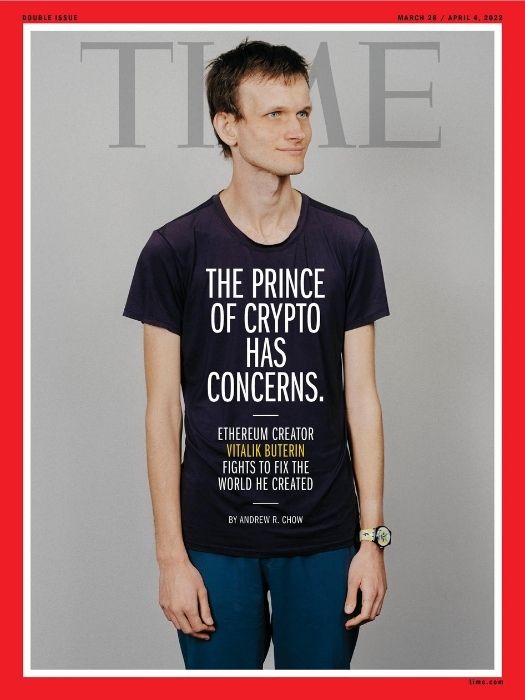- TIME magazine features a cover story on Ethereum co-founder Vitalik Buterin.
- Buterin expressed his fears and hopes for the network.
- He plans to continue being more vocal about social change this year.
Ethereum co-founder Vitalik Buterin was just featured on the cover of TIME Magazine. In Buterin’s interview with the leading magazine, the programmer expressed his concerns and hopes for the Ethereum network.
Concerns And Hopes
Vitalik Buterin was the cover of TIME magazine’s double issue for March and April. The cover of the magazine issue showed the programmer in a black t-shirt and blue denim trousers. Buterin was interviewed by the leading magazine in February while in Denver.

Buterin admitted that the crypto space may do as much harm as good. He was quoted as saying, “Crypto itself has a lot of dystopian potentials if implemented wrong.” The Canadian programmer who spent his early years in Russia expressed concerns that the space was being overrun with greed and pursuit of status.
However, the Ethereum creator said he hoped the blockchain would be a tool for social change. Hoping it would fix systemic issues today, from poor voting systems to city planning to even authoritarian regimes and big tech monopolies. He said he needed to become more vocal, noting that without that, much of the focus is likely to lean towards projects with financial incentives, which he concludes are not usually what the world needs.
Buterin has become more vocal about the future of the network and sociopolitical issues in recent times. But, he said, “I’ve been yelling a lot, and sometimes that yelling does feel like howling into the wind.”
 
 
Ethereum is a decentralized blockchain created that way because Buterin believes no single person should control the direction of the network. All the programmer can do is exercise his voice on various platforms to convince people to look beyond immediate gains and towards broader utility.
Buterin’s Position On Russia’s Invasion Of Ukraine
Buterin took to Twitter at the beginning of the conflict in eastern Europe to express his frustration with Putin’s decision to invade Ukraine and not seek a peaceful resolution. In the tweet, he said that while Ethereum as a network was non-partisan, he was not.
Since the conflict started, millions of dollars have been donated in crypto to the people of Ukraine. A factor that no doubt has contributed to the Ukrainian government’s decision to legalize the digital asset class.
In a letter to TIME magazine some days ago, the programmer noted that while the war effort by Putin is regretful, it has reminded people that the purpose of crypto was to impact the world positively. He said he planned to continue to lend his voice to more social causes this year adding, “I would rather Ethereum offend some people than turn into something that stands for nothing.”


